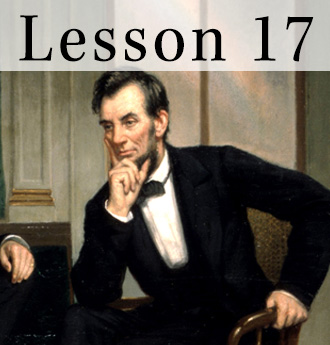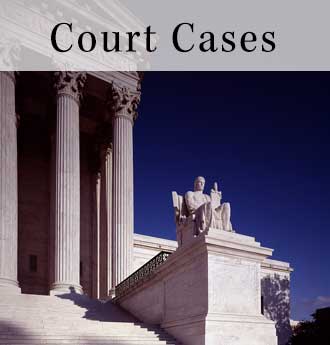Lesson 17: How Did the Civil War Test and Transform the American Constitutional System?
The case summaries below were provided by Oyez and licensed under the Creative Commons Attribution-NonCommercial 4.0 International License. Please visit Oyez.org for more case summaries.
Dred Scott v. Sandford (1856)
Facts of the case:
Dred Scott was a slave in Missouri. From 1833 to 1843, he resided in Illinois (a free state) and in an area of the Louisiana Territory, where slavery was forbidden by the Missouri Compromise of 1820. After returning to Missouri, Scott sued unsuccessfully in the Missouri courts for his freedom, claiming that his residence in free territory made him a free man. Scott then brought a new suit in federal court. Scott's master maintained that no pure-blooded Negro of African descent and the descendant of slaves could be a citizen in the sense of Article III of the Constitution.
Case Question:
Was Dred Scott free or slave?
Case Conclusion:
Dred Scott was a slave. Chief Justice Taney argued that, under Articles III and IV, no one but a citizen of the United States could be a citizen of a state, and that only Congress could confer national citizenship. Taney reached the conclusion that no person descended from an American slave had ever been a citizen for Article III purposes. The Court then held the Missouri Compromise unconstitutional, hoping to end the slavery question once and for all.
Citation:
The Oyez Project, Dred Scott v. Sandford, 60 U.S. 393 (1857) available at:
Link to case: http://oyez.org/cases/1851-1900/1856/1856_0
Ex Parte Milligan (1866)
Facts of the case:
Lambden P. Milligan was sentenced to death by a military commission in Indiana during the Civil War; he had engaged in acts of disloyalty. Milligan sought release through habeas corpus from a federal court.
Case Question:
Does a civil court have jurisdiction over a military tribunal?
Case Conclusion:
Yes. Davis, speaking for the Court, held that trials of civilians by presidentially created military commissions are unconstitutional. Martial law cannot exist where the civil courts are operating.
Citation:
The Oyez Project, Ex parte Milligan, 71 U.S. 2 (1866)
Link to case: https://www.oyez.org/cases/1850-1900/71us2
Texas v. White (1868)
Facts of the case:
In 1851, Congress authorized the transfer of $10 million worth of United States bonds to the state of Texas. The bonds were payable to the state or bearer and were to be redeemable in 1864. In 1862, during the Civil War, an insurgent Texas legislature authorized the use of the bonds to purchase war supplies. Four years later, the reconstruction government tried to reclaim the bonds.
Case Question:
Was Texas a state in the union eligible to seek redress in the Supreme Court? Could Texas constitutionally reclaim the bonds?
Case Conclusion:
Yes. In a 5-to-3 decision, the Court held that Texas did indeed have the right to bring suit and that individuals such as White had no claim to the bonds in question. The Court held that individual states could not unilaterally secede from the Union and that the acts of the insurgent Texas legislature--even if ratified by a majority of Texans--were "absolutely null." Even during the period of rebellion, however, the Court found that Texas continued to be a state.
Citation:
The Oyez Project, Texas v White, 74 U.S. 700 (1869)
Link to case: https://www.oyez.org/cases/1850-1900/74us700
The Slaughterhouse Cases (1873)
Facts of the case:
Louisiana had created a partial monopoly of the slaughtering business and gave it to one company. Competitors argued that this created "involuntary servitude," abridged "privileges and immunities," denied "equal protection of the laws," and deprived them of "liberty and property without due process of law."
Case Question:
Did the creation of the monopoly violate the Thirteenth and Fourteenth Amendments?
Case Conclusion:
No. The involuntary servitude claim did not forbid limits on the right to use one's property. The equal protection claim was misplaced since it was established to void laws discriminating against blacks. The due process claim simply imposes the identical requirements on the states as the fifth amendment imposes on the national government. The Court devoted most of its opinion to a narrow construction of the privileges and immunities clause, which was interpreted to apply to national citizenship, not state citizenship.
Citation:
The Oyez Project, The Slaughterhouse Cases, 83 U.S. 36 (1873)
Link to case: https://www.oyez.org/cases/1850-1900/83us36
Guinn v. United States (1915)
Facts of the case:
The Oklahoma Constitution, while appearing to treat all voters equally, allowed an exemption to the literacy requirement for those voters whose grandfathers had either been eligible to vote prior to January 1, 1866 or were then a resident of "some foreign nation," or were soldiers. It was an exemption that favored white voters while it disfranchised black voters, most of whose grandfathers had been slaves and therefore unable to vote before 1866.
Case Question:
Are these kinds of exemptions to the literacy requirements a violation of the Fifteenth Amendment?
Case Conclusion:
Yes. Justice Edward White went on to strike down the grandfather clause. He saw the Oklahoma law for what it was--a bald-faced attempt to disenfranchise blacks. Justice White wrote that the act "inherently brings" discrimination based on race "into existence since it is based purely on a period of time before the enactment of the Fifteenth Amendment and makes that period the controlling and dominant test of the right of suffrage.
Citation:
238 U.S. 347 (1915)
Link to case: http://caselaw.findlaw.com/us-supreme-court/238/347.html
Smith v. Allwright (1944)
Facts of the case:
A resolution of the Democratic Party of Texas, a group that the Texas Supreme Court had deemed a "voluntary association," allowed only whites to participate in Democratic primary elections. S.S. Allwright was a county election official; he denied Lonnie E. Smith, a black man, the right to vote in the 1940 Texas Democratic primary.
Case Question:
Did denying blacks the right to vote in primary elections violate the Fifteenth Amendment?
Case Conclusion:
Yes. The Court overruled its decision in Grovey v. Townsend (1935) and found the restrictions against black people unconstitutional. Even though the Democratic Party was a voluntary organization, the fact that Texas statutes governed the selection of county-level party leaders, the party conducted primary elections under state statutory authority, and state courts were given exclusive original jurisdiction over contested elections, guaranteed for black people the right to vote in primaries. Allwright engaged in state action abridging Smith's right to vote because of his race. A state cannot "permit a private organization to practice racial discrimination" in elections, argued Justice Reed. (The Court's decision in this matter was amended on June 12, 1944.)
Citation:
The Oyez Project, Smith v. Allwright, 321 U.S. 649 (1944)
Link to case: https://www.oyez.org/cases/1940-1955/321us649








